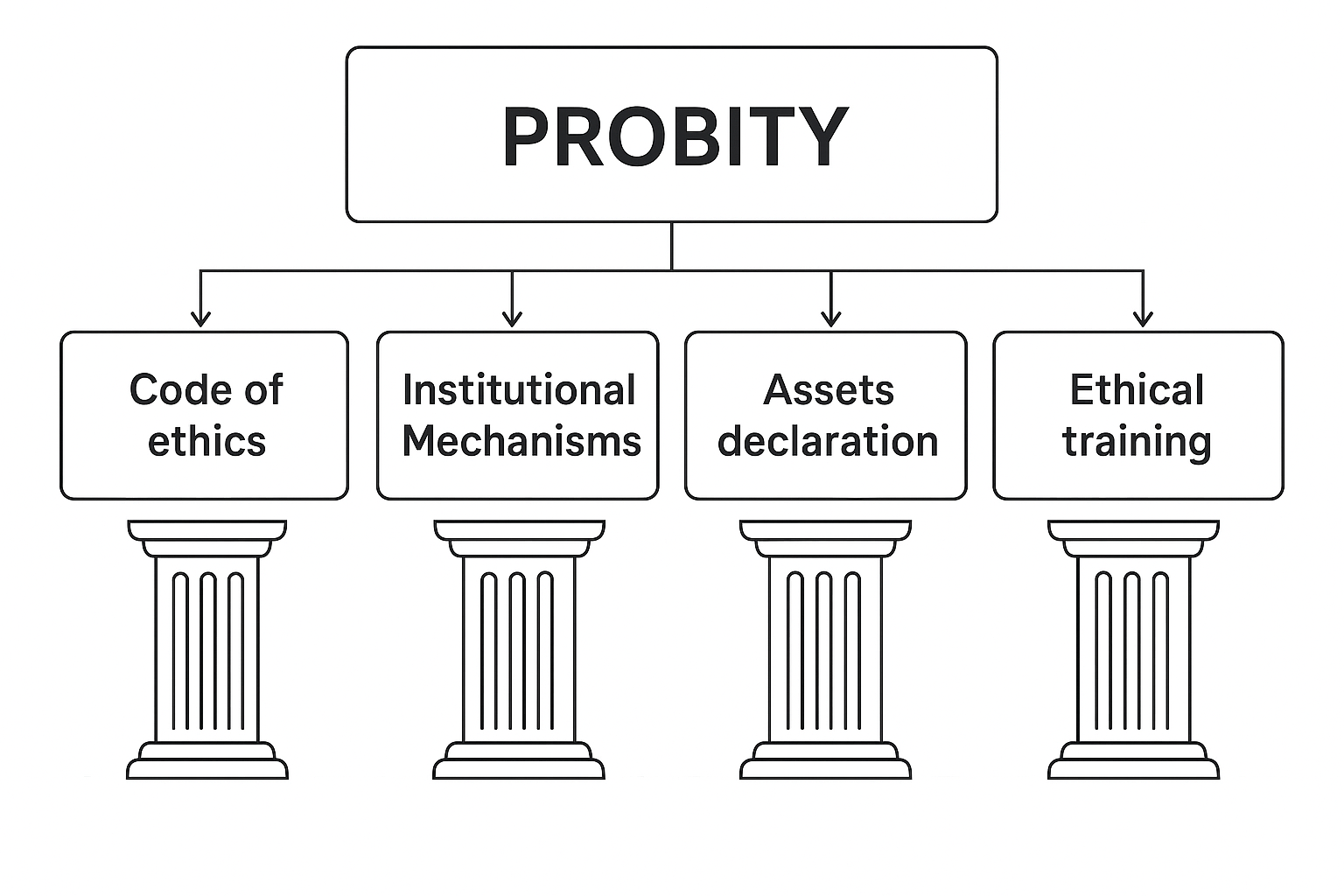Probity is essential for an effective system of governance and socio-economic development.’ Discuss.
Probity is essential for an effective system of governance and socio-economic development.’ Discuss.
Probity refers to the quality of having strong moral principles like honesty, integrity, and uprightness in public life. It is a cornerstone of ethical governance and a prerequisite for transparency, accountability, and trust in public institutions.
In a democracy like India, where governance intersects with the needs of millions, probity ensures rule of law, responsible decision-making, and people-centric development.
Importance of Probity in Governance:
-
Promotes Trust in Public Institutions: Citizens are more likely to comply with laws and policies when they trust institutions to act ethically and fairly.
Example: The success of Jan Dhan Yojana and Direct Benefit Transfer (DBT) owes much to institutional integrity, reducing leakages and building trust.
-
Reduces Corruption and Arbitrary Use of Power: Probity helps plug loopholes and prevents misuse of discretionary powers.
Example: The Vigilance and Anti-Corruption Bureau of Kerala exposed several officials in bribery cases, improving deterrence and transparency.
-
Enables Ethical Leadership and Policy-Making: Decisions taken with integrity consider long-term public welfare over short-term political gains.
Example: E. Sreedharan, known for his ethical leadership in Delhi Metro, ensured high-quality infrastructure without time or cost overruns.
-
Enhances Public Service Delivery: Probity reduces bureaucratic red tape, favoritism, and negligence in service delivery.
Example: Mission Karmayogi aims to instill values like transparency and ethical conduct among civil servants to enhance efficiency and public responsiveness.
-
Essential for Judicial and Legal Fairness: Upholding probity in judicial conduct ensures fairness, equity, and public faith in justice.
Example: The recusal of Justice Chandrachud in cases involving conflict of interest upheld ethical standards of judicial integrity.
-
Drives Socio-Economic Development: Ethical governance channels public funds to genuine development rather than into corrupt networks.
Example: Mahatma Gandhi National Rural Employment Guarantee Act (MGNREGA) is more impactful in states with transparent fund disbursement systems.
-
Strengthens Democratic Accountability: Probity makes politicians and bureaucrats accountable through mechanisms like RTI, audits, and citizen charters.
Example: The CAG audit on coal block allocations (2012) brought massive public scrutiny and policy correction.
Measures to Promote Probity
-
Enacting and Enforcing a Code of Ethics and Conduct: A clearly laid down ethical framework helps guide civil servants and politicians in ethical decision-making and prevents misuse of power.
Example: The Conduct Rules for Civil Servants under the Central Civil Services (Conduct) Rules, 1964, outline acceptable behavior, such as avoiding conflict of interest and maintaining integrity.
-
Strengthening Institutional Mechanisms (e.g., Lokpal, CVC, CBI): Strong anti-corruption institutions ensure investigation and accountability in governance.
-
Whistleblower Protection and Grievance Redressal: Encouraging insiders to report corruption strengthens transparency and citizen engagement.
Example: Whistle Blowers Protection Act, 2014, though not fully operationalized, is a legal attempt to shield whistleblowers.
-
Asset Declarations and Lifestyle Audits: Mandating public officials to disclose assets promotes transparency and deters illicit wealth accumulation.
Example: The Election Commission of India requires candidates contesting elections to file affidavits disclosing movable and immovable assets, liabilities, and criminal cases.
-
Ethics Training and Value-based Reforms (Mission Karmayogi): Promoting ethical orientation among public servants to instill integrity and empathy.
Example: Mission Karmayogi, launched in 2020, aims to build future-ready civil servants with training in ethics, public service values, and transparency via iGOT platform.
Probity is not a luxury but a fundamental necessity in ensuring that governance is ethical, inclusive, and development-oriented. It builds a culture of integrity that safeguards democracy and empowers both the state and the citizen. Only a system guided by high ethical standards can deliver long-term, sustainable socio-economic growth and uphold the ideals of the Constitution.
Answer Length
Model answers may exceed the word limit for better clarity and depth. Use them as a guide, but always frame your final answer within the exam’s prescribed limit.
In just 60 sec
Evaluate your handwritten answer
- Get detailed feedback
- Model Answer after evaluation
Model Answers by Subject
Crack UPSC with your
Personal AI Mentor
An AI-powered ecosystem to learn, practice, and evaluate with discipline

